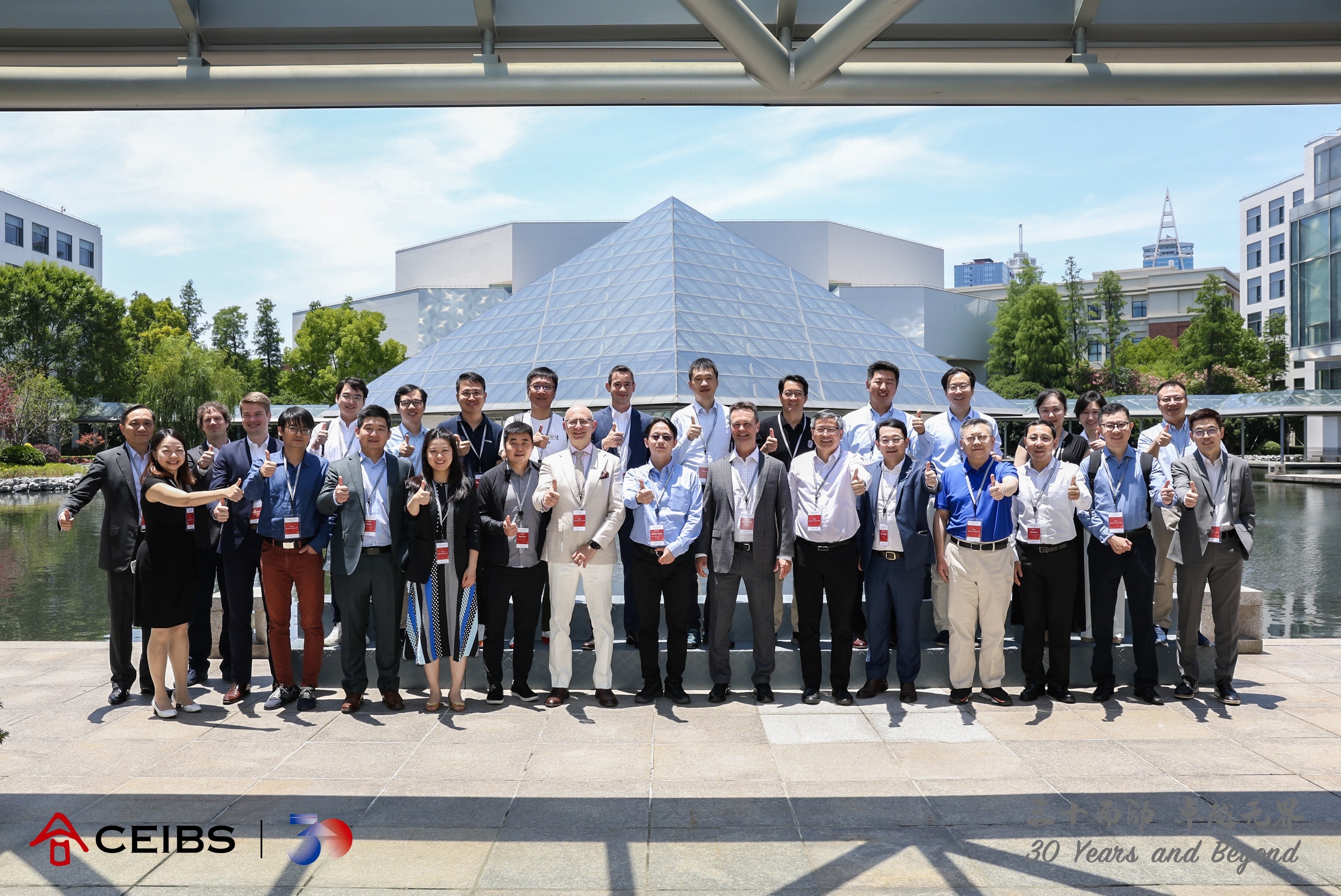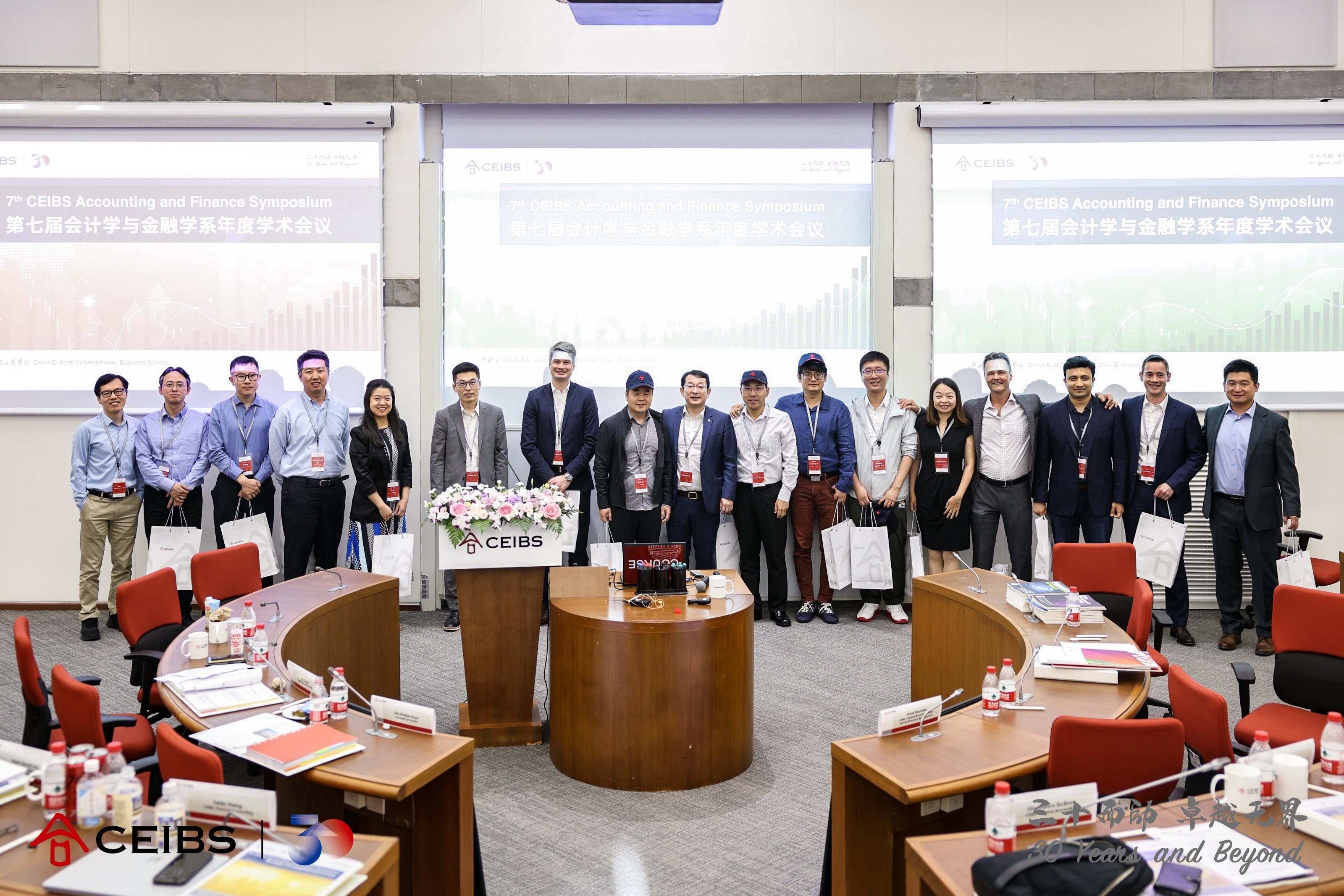7th CEIBS Finance and Accounting Symposium Held
June 18, 2024. Shanghai - The 7th CEIBS Finance and Accounting Symposium was held at the CEIBS Shanghai campus on June 18, 2024, with the theme "Current Topics in Accounting", bringing together more than 100 scholars from top universities in the US, Europe, and Asia to discuss current issues at the intersection of accounting, finance, economics, and politics.
Organised by the CEIBS Department of Finance and Accounting, this symposium aims to build a platform for finance and accounting scholars from around the world to share their latest research and exchange new ideas, while also showcasing CEIBS to the global academic community. This year, the symposium received more than 120 submissions, with seven papers selected for the final programme. Professor Ole-Kristian Hope from the University of Toronto served as keynote speaker and presented a paper titled “Investors and Carbon Disclosure”.
In his welcome address, CEIBS Vice President and Dean Frank Bournois highlighted how the symposium echoes the school’s mission of “China Depth, Global Breadth.” He emphasized that bringing distinguished scholars from around the world to China to discuss challenging issues of global significance is a testament to CEIBS' commitment to its mission.
During the one-day symposium, each paper was allocated 25 minutes for presentation, 15 minutes for discussion, and ten minutes for Q&A. Read on for presentation summaries from the symposium.

Keynote Speech: Investors and Carbon Disclosure
Presenter: Ole-Kristian Hope, University of Toronto
In the first half of his talk, Professor Hope discussed whether investors really care about carbon disclosure. In the second half, he presented a working paper coauthored with Giulia Sargiacomo, which investigates the role of uncertainty about investors’ preferences in voluntary climate change-related disclosure. Motivated by Bond and Zeng’s (2022) analytical model, they examined whether firms choose to remain silent and/or vague to mitigate potential dissatisfaction among investors when uncertain of how the voluntary disclosure will be perceived.
Their findings indicate that uncertainty about investors’ environmental preferences is positively related to silence and vagueness in voluntary climate change disclosure, using both dictionary-based and ClimateBert-based (a large language model trained on the topic of climate-change disclosure) measures. Moreover, they show that companies which display extreme environmental performance (either extremely “bad” or extremely “good”) use more silence and vagueness in their disclosures when facing uncertainty of institutional investors’ preferences. Additional analyses showed that a dispersed general opinion about corporate efforts toward climate change is positively associated with higher levels of silence and vagueness. Finally, their tests revealed that the level of silence and vagueness in the preceding year is positively associated with analysts’ climate change interest during Q&A sessions in earnings calls.
Extracting Like There’s No Tomorrow: Policy Uncertainty, Firm Production, and Environmental Impact
Presenter: Bin Li, Vanderbilt University
Discussant: Albert Tsang, Southern University of Science and Technology
Professor Li and his coauthors investigate the impacts of policy uncertainty on firm production and pollution. Their empirical setting exploits the 2020 US Supreme Court decision in McGirt v. Oklahoma, which designated the eastern half of Oklahoma as “Indian country” rather than state land. Analysing a comprehensive sample of oil-producing wells in Oklahoma, they found that well-level oil production increased by 10% following the McGirt ruling for wells in the eastern tribal areas, driven by accelerated production rates. This production increase was coupled with more investments in new wells and faster depletion of existing ones. Using a novel dataset derived from high-resolution satellite imagery, they observed a surge in well-level air pollution emissions due to intensified oil extraction. Unfortunately, local residents experience minimal economic benefits from the increased oil extraction while suffering from harmful environmental externalities. Overall, this study highlights a crucial trade-off between economic benefits and environmental impacts for firms facing policy uncertainty.
The Effect of Financial Regulation on Nonfinancial Violations
Presenter: Vincent Giese, University of Mannheim
Discussants: Yupeng Lin, National University of Singapore
Mr Giese presented a paper coauthored with Professor Jonas Heese from Harvard Business School examining the effect of compliance with financial regulation on nonfinancial violations. Using differences in compliance requirements with the Sarbanes–Oxley Act (SOX) Section 404, they found that compliance with Section 404 increased firms’ propensity for nonfinancial violations by 2.8 percentage points or 43.8% of the sample mean. These effects are stronger for firms with greater external scrutiny toward their financial reporting, greater challenges in monitoring their operations, and limited resources. These results, together with an examination of conference call transcripts and 10-K disclosures, suggest that the effects primarily stem from a shift in attention and resources toward SOX 404 compliance. Furthermore, the effects are concentrated in employee-related and environmental violations, and occur after internal control weaknesses are detected, suggesting that their findings generalize beyond the SOX 404 setting. Overall, the results suggest that financial reporting regulation can result in unintended consequences that harm stakeholders, including employees and the environment.
Corporate Responses to Generative AI: Early Evidence from Conference Calls
Presenter: Guang Ma*, Rutgers University—New Brunswick
Discussant: Sean Cao, University of Maryland
Professor Ma and his coauthors provide early evidence of the potential impact of generative artificial intelligence (GAI) on corporations through managerial discussions of the subject in conference calls following the release of ChatGPT in November 2022. Following its release, managerial discussions of GAI in conference calls increased substantially, with the increase more pronounced in firms with greater innovation intensity, cybersecurity threats, product differentiation, labour exposure to AI, and customer operations, suggesting that these firms are more likely to be affected by GAI. Managers tend to believe that GAI is more beneficial to firms with greater innovation intensity and cybersecurity threats but is more detrimental to firms with greater product differentiation. While they hold mixed views on GAI’s impact on firms with greater labour exposure to AI and customer operations, their views are more likely to be positive than negative. Managers of firms with greater innovation intensity, cybersecurity threats and customer operations (product differentiation) increase initiative-related (non-initiative-related) discussions more. While managers of firms with greater labour exposure to AI increase discussions of both types more, they are more likely to increase initiative-related discussions. Overall, this study sheds light on the heterogeneous corporate perceptions of GAI’s impacts and responses.
Towards a Financial Statement-Based Approach to Modelling Systemic Risk in Insurance and Banking
Presenter: Venkat Peddireddy, CEIBS
Discussant: Rui Shen, The Chinese University of Hong Kong, Shenzhen
CEIBS Assistant Professor of Accounting Venkat Peddireddy presented a paper coauthored with Professor Shivaram Rajgopal from Columbia Business School. This paper proposes a financial statement-based approach to estimating the vulnerability of a financial institution to a systemic event (hereinafter referred to as CRISK). They argue that SRISK, a widely cited measure of systemic risk proposed by Brownlees and Engle (2017) and Acharya et al. (2012), relies on volatile stock market data and makes several simplifying assumptions. Their measure, CRISK, instead exploits accounting fundamentals and is tailored to the distinct characteristics of insurance companies and commercial banks. Their empirical analysis shows that: (1) compared to CRISK, SRISK overstates the capital requirements for insurance companies and banks that are heavily reliant on FDIC insured deposits, while it understates the capital requirement for banks more reliant on uninsured deposits; (2) CRISK performs better than SRISK at predicting capital injections carried out by the Federal Reserve during the 2007-2009 financial crisis; and (3) CRISK is positively correlated with short interest. In sum, the authors suggest using SRISK as an initial screening tool to shortlist potential systemically important institutions, then refining the list and validating the expected capital shortfall using CRISK.
Market Reaction to Voting Intention Disclosures
Presenter: Xi Li, London School of Economics and Political Science
Discussant: David Erkens, CEIBS
Professor Li presented her recent working paper examining the stock market reaction to Norges Bank Investment Management’s (NBIM) publicly disclosed voting intentions ahead of its portfolio companies’ annual general meetings (AGMs). This paper categorizes NBIM’s voting intention as “dissent” when it disagrees with the management’s vote recommendation for a proxy proposal at the forthcoming AGM. The authors analyse market reaction to NBIM’s announcement of dissent votes to proposals where the votes are expected to be contentious, i.e., those passing or failing by a small margin at the AGM, documenting positive abnormal returns around the announcement of dissent voting intentions. The returns are higher for portfolio firms located in countries with weaker corporate governance structures, when NBIM owns a larger block of shares, and among proposals concerning financing and investment activities. Their results support the notion that investors view dissent votes by an influential institutional shareholder as value-enhancing, especially when these votes could potentially change the voting outcome. This study contributes to the ongoing discussion about enhancing the transparency of institutional investors’ voting practices.
Adoption of Artificial Intelligence in Accounting and Management Earnings Forecast
Presenter: Mark (Shuai) Ma, University of Pittsburgh
Discussant: Xindong (Kevin) Zhu, City University of Hong Kong
Professor Ma presented a paper exploring how AI adoption shapes management earnings forecasts. Using a novel dataset of online job postings, Professor Ma and his coauthors identified firms that have adopted artificial intelligence in accounting based on the hiring of accountants with artificial intelligence skills. Their difference-in-differences regressions find that firms’ management earnings forecast accuracy significantly increases after these firms adopt artificial intelligence in accounting. Interestingly, artificial intelligence in accounting mainly mitigates errors in management forecasts due to economic uncertainty, but not intentional biases caused by management’s economic incentives. Further, financial analysts appear to understand the implications of artificial intelligence in accounting for management earnings forecasts. In addition, they provide a number of tests to rule out several alternative explanations. Overall, their study helps us better understand the consequences of adopting artificial intelligence in accounting to firms’ voluntary disclosure behaviour.
Regulatory Enforcement of Public Disclosure and Connected Investors in Corporate Bond Issuance
Presenter: Yi Ding, The Chinese University of Hong Kong, Shenzhen
Discussant: Shuqing Luo, The University of Hong Kong
Professor Ding presented a study on how regulatory enforcement of public disclosure influences corporate bond issuance in China. Using a proprietary dataset of bond allotments in China, Professor Ding and his coauthors found that bond regulators’ comment letters (CLs) on the issuers’ public disclosures negatively affect the completion of the issuance. However, among the bonds that are issued successfully, they observe that connected investors - financial institutions with a prior business relationship with the issuers - increase their bond purchases, which mitigates the CLs’ negative effect on the bond issuance. Further analyses show that the connected investors’ increase in bond purchases is motivated by both their superior private information about the CL recipients and a quid pro quo relationship with the CL recipients.












